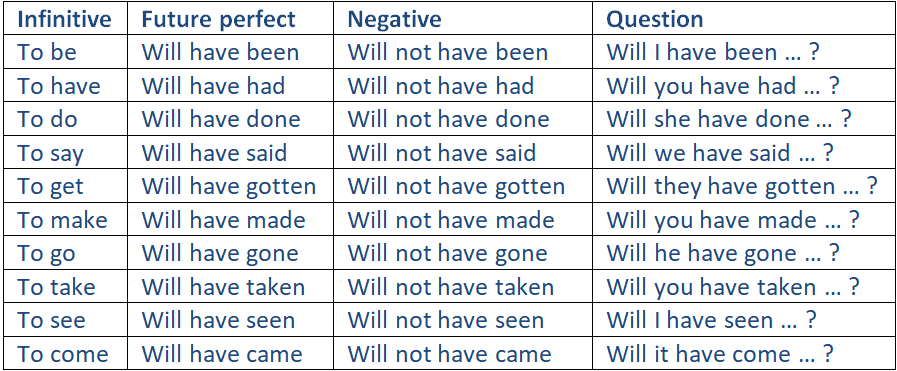


 Grammar
Grammar
 Tenses
Tenses
 Present
Present
 Past
Past
 Future
Future
 Parts Of Speech
Parts Of Speech
 Nouns
Nouns
 Verbs
Verbs
 Adverbs
Adverbs
 Adjectives
Adjectives
 Pronouns
Pronouns
 Pre Position
Pre Position
 Preposition by function
Preposition by function 
 Preposition by construction
Preposition by construction
 Conjunctions
Conjunctions
 Interjections
Interjections
 Grammar Rules
Grammar Rules
 Linguistics
Linguistics
 Semantics
Semantics
 Pragmatics
Pragmatics
 Reading Comprehension
Reading Comprehension|
Read More
Date: 31-3-2021
Date: 31-3-2021
Date: 31-3-2021
|
Future Perfect
The future perfect is a verb tense used for actions that will be completed before some other point in the future.
Example :
The parade will have ended by the time Chester gets out of bed. At eight o’clock I will have left.
Key words: Verb, past participle, tense, preposition
The future perfect tense is for talking about an action that will be completed between now and some point in the future. Imagine that your friend Linda asks you to take care of her cat for a few days while she goes on a trip. She wants you to come over today at noon so she can show you where to find the cat food and how to mash it up in the bowl just right so that Fluffy will deign to eat it. But you’re busy this afternoon, so you ask Linda if you can come at eight o’clock tonight instead.
“No, that won’t work! At eight o’clock I will have left already,” she says.
What does the future perfect tell us here? It tells us that Linda is going to leave for her trip some time after right now, but before a certain point in the future (eight o’clock tonight). She probably shouldn’t have waited until the last minute to find a cat sitter.
The Future Perfect Formula
The formula for the future perfect tense is pretty simple: will have + [past participle]. It doesn’t matter if the subject of your sentence is singular or plural. The formula doesn’t change.
When to Use the Future Perfect Tense
Sometimes, you can use the future perfect tense and the simple future tense interchangeably. In these two sentences, there is no real difference in meaning because the word before makes the sequence of events clear:
Example :
Linda will leave before you get there. Linda will have left before you get there.
But without prepositions such as before or by the time that make the sequence of events clear, you need to use the future perfect to show what happened first.
Example :
At eight o’clock Linda will leave. (This means that Linda will wait until 8 o’clock to leave.) At eight o’clock Linda will have left. (This means Linda will leave before 8 o’clock.)
When Not to Use the Future Perfect Tense
The future perfect tense is only for actions that will be complete before a specified point in the future. In other words, the action you’re talking about must have a deadline. If you don’t mention a deadline, use the simple future tense instead of the future perfect tense.
Correct Linda will leave.
Incorrect Linda will have left.
The deadline can be very specific (eight o’clock) or it can be vague (next week). It can even depend on when something else happens (after the parade ends). It just has to be some time in the future.
How to make the Future Perfect Negative
Making a negative future perfect construction is easy! Just insert not between will and have.
Example :
We will not have eaten breakfast before we get to the airport tomorrow morning. They will not have finished decorating the float before the parade.
You can also use the contraction won’t in the place of will not. They won’t have finished decorating the float before the parade.
How to Ask a Question
The formula for asking a question in the future perfect tense is will + [subject] + have + [past participle]:
Example
Will you have eaten lunch already when we arrive? Will they have finished decorating the float before the parade?
Prepositional Phrases that Often Go With the Future Perfect
By this time next week, Linda will have left for her trip. Three days from now, we will have finished our project. At midnight, the party will have ended. Will you have eaten already? Chester will not have arrived by the time the parade is over. When I travel to France, I will have been to ten countries. My sister will have cleaned the bathroom before the party. As soon as someone buys this chair, I will have sold all the furniture I wanted to get rid of.
Common Regular Verbs in the Future Perfect Tense

Common Irregular Verbs in the Future Perfect Tense

Be careful when using the verb “to be” in the future perfect tense. The construction is easy to confuse with the future perfect continuous tense.
The past participle of “to get” is gotten in American English. In British English, the past participle is got.
|
|
|
|
دراسة يابانية لتقليل مخاطر أمراض المواليد منخفضي الوزن
|
|
|
|
|
|
|
اكتشاف أكبر مرجان في العالم قبالة سواحل جزر سليمان
|
|
|
|
|
|
|
اتحاد كليات الطب الملكية البريطانية يشيد بالمستوى العلمي لطلبة جامعة العميد وبيئتها التعليمية
|
|
|